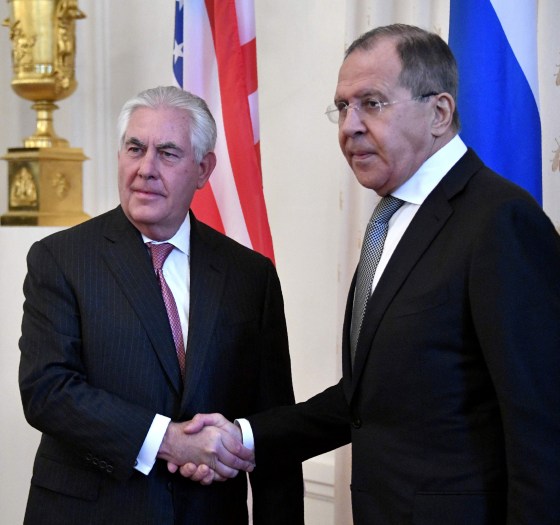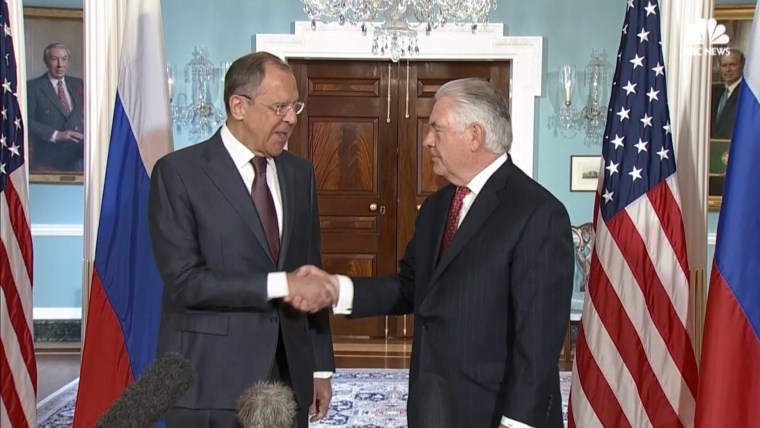Russian Foreign Minister Sergey Lavrov will meet with President Donald Trump and Secretary of State Rex Tillerson Wednesday, in his first visit to Washington since August 2013.
The visit takes place during a time when U.S.-Russian relations are "at a low point," according to Tillerson, and tensions surrounding Russian attempts to influence recent U.S. elections remain high.
The meeting with Tillerson was first announced on last Wednesday, but also notably comes the day after Trump fired FBI Director James Comey — ostensibly for his handling of the Hillary Clinton email investigation. But many have pointed to the fact that Comey was also in charge of an investigation into the Trump campaign's ties to Russia.
Lavrov will be the highest-ranking Russian official to meet with Trump since he took office.
The last time a Russian president visited Washington was then Russian President Dmitri Medvedev in June of 2010. Tillerson and Lavrov have met twice, first in Bonn, Germany in February and again in Moscow in April.
Related: What You Need to Know About Trump, Comey and the Russia Probe
Lavrov and Tillerson are expected to discuss “the need to stop the violence” in Eastern Ukraine, according to the State Department, and will work to "set the stage for a political settlement in Syria." It was these same two points of tension that dominated the dynamic of the two world powers in the closing years of the Obama administration.
The United States and Russia still have sharp differences on the solution to the over six-year Syrian war. The Kremlin continues to back Syrian leader Bashar al-Assad despite Washington's expressed view that his regime can play no role in the country's political future.
And the two governments still disagree on Assad’s role in last month's chemical gas attack, which left dozens of civilians dead and spurred Trump to retaliate by launching 59 cruise missiles at a Syrian airbase.
Wednesday’s Syria discussions will also include the so-called "de-escalation zones" agreed to by Russia, Turkey and Iran in a deal reached in Astana, Khazakstan, last week.
That agreement calls for the establishment of four designated ceasefire areas with the “aim to put a prompt end to violence,” and allow “rapid, safe and unhindered humanitarian access” to Syrian civilians. The United States, which was present but did not directly participate in the discussions, has expressed skepticism over the deal.
“It's not been decided, in the sense that these are the specific safe zones, here's who's going to be ensuring they're safe, who is signing up for it, who is specifically to be kept out of them,” Secretary of Defense Jim Mattis told reporters Monday. “There's a lot of details to be worked out.”
The Syrian government has already rejected any U.N. monitoring role of the zones, which are largely in territory controlled by Syrian rebel forces in opposition to Assad.
Related: Trump Hires Law Firm to Fight Suggestions of Russia Business Ties
Meanwhile, on Ukraine, the State Department has said the secretary of state and Russian foreign minister "will discuss the need to stop the violence in eastern Ukraine and resolve the conflict through the full implementation of the Minsk agreements."
The "Minsk agreement" reached in 2015 called for a ceasefire between Ukrainians and Russian backed separatists but the fighting has largely continued. Speaking from Moscow in April, Tillerson called on Russia to take steps towards the agreement by withdrawing separatist armed forces and heavy weapons "so that OSCE [Organization for Security and Cooperation in Europe] and observers can fulfill their role."
Since that time, the situation in Eastern Ukraine largely has not changed and in late April an American paramedic working for the monitoring group was killed. The U.S. has called for a transparent and timely investigation.
Asked Monday by NBC News if the Lavrov's visit to Washington was a sign that U.S.-Russian relations might be improving, Tillerson responded: "We shall see."


